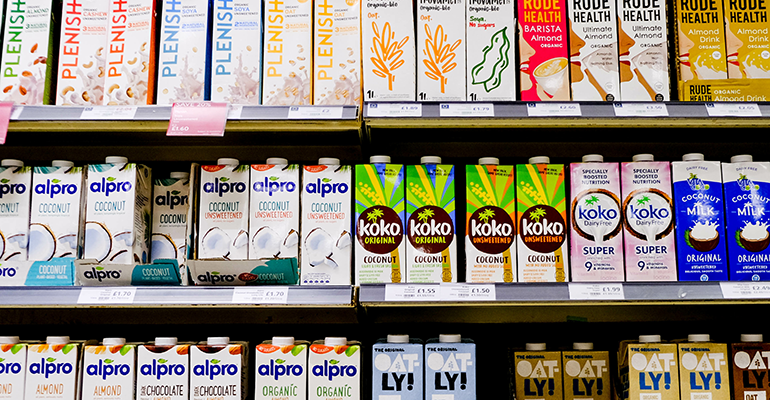News
MOMA partners with UK university to optimise oat milk
10 Feb 2023Oat milk brand MOMA Foods is optimising the ingredients in its oat milk and improving sustainability in a co-funded project with the UK’s Teesside University.
Oats have become a popular ingredient in plant-based dairy products over recent years with their use growing by 18% and 11% in plant-based milk drinks, plant-based ice cream and frozen yoghurt respectively, from 2018 to 2022, according to Mintel.

MOMA Foods has grown rapidly since its foundation in 2006 and launched its first range of oat milk in 2020, following a Knowledge Transfer Partnership (KTP) with Portsmouth and Teesside universities.
Building on its previous success, MOMA recently announced that it will support the funding of a PhD studentship at Teesside, working alongside professor John S. Young from the National Horizons Centre, the national centre of excellence for bioscience at the university.
Improving oat milk through science
The project aims to develop novel methods of testing the quality of oat milk onsite by creating a new monitoring tool, which will analyse fat and protein content. It will also involve working with suppliers to optimize ingredients and explore approaches to creating new strains of enzymes to break down oats.
“It’s vitally important that we bring academic knowledge into the industry and don’t operate in a silo and working with Teesside University will help us to achieve this,” said Tom Mercer, founder of MOMA Foods.
MOMA’s oat milk range was initially developed with the support of Portsmouth and Teesside University academics who worked to refine the ingredients and ensure the right combination of enzymes were being used to break down the starch in the oats. This resulted in a foamable product that did not split when added to hot liquid.
The results of this partnership have been significant, with oat milk overtaking porridge as MOMA’s best-selling product. The milk has received several awards, including a Great Taste Award, and is stocked at a range of key retailers in the UK including Tesco, Waitrose, and Sainsbury’s.
A sustainable solution to traditional dairy
Traditional milk production accounts for around 2.2% of global greenhouse gas emissions. Oat milk, which can contribute to reducing greenhouse gas emissions by reducing methane production from cows, offers a sustainable alternative to traditional dairy milk.
“At Teesside University, a key pillar of our research strategy is forging a smarter, greener economy through novel and disruptive technologies. Our ongoing relationship with MOMA has already delivered real impact by helping the company develop an innovative product that is not only creating jobs and new markets for the business but could have a real impact in reducing global emissions,” said professor John S. Young.
Addressing the call for reduced-sugar alternatives
Where sustainability is concerned, oat milk significantly outperforms traditional milk. One study found that oat milk production requires 60% less energy, 80% fewer greenhouse gas emissions, and 80% less land than cow milk.
 © AdobeStock/Martin Lee
© AdobeStock/Martin Lee
Yet questions have been raised as to the healthiness of oat alternative products. While most unsweetened (no added sugar) oat milk brands contain less sugar than traditional milk, the claim that they are sugar-free is oftentimes misleading. Oatly Original contains around 7 g of sugar per serving, compared to Silk Oat Yeah, Planet Oat, and Quaker Oat Beverage which contain 5 g, 4 g, and 0 g respectively.
Often, these naturally occurring sugars are the result of the enzymatic process that occurs when oat starch is broken down after being mixed with water to create the oat milk base. According to guidance issued by the US Food and Drug Administration (FDA) in 2018, sugars created through processes such as hydrolysis should be declared as added sugars on product labels.
MOMA is yet to confirm whether the project will also seek to reduce the sugar content and boost the healthiness of their oat milk.
Related news

FoodTech investment plummets, but biotech and circularity are on the rise
4 Apr 2025
The 2024 FoodTech 500 highlights a major shift in innovation focus, with functional ingredients, biotech, and waste upcycling climbing the ranks amid a steep drop in global funding.
Read more
Value is a top priority for today’s F&B consumers
3 Apr 2025
Research from global consultancy Hartman Group suggests there are six core values that brands must tap into to connect with consumers’ needs.
Read more
EU Omnibus proposal risks dismantling ESG protections for smallholder farmers
1 Apr 2025
Civil society organisations are calling on policymakers to reject proposed changes to EU sustainability legislation, saying they pose a risk to protections for smallholder farmers.
Read more
Make plant-based meat ‘tastier and more affordable’ to fight climate change
31 Mar 2025
The UK’s Climate Change Committee is calling for tastier, more affordable plant-based meat offerings as part of measures to counteract the nation’s environmental impact.
Read more
Clean-label cereals prompt fortification debate
28 Mar 2025
Marks & Spencer has caused a stir with the launch of a range of breakfast cereals in the UK containing minimal ingredients.
Read more
Changing global food retail environments linked to rise in obesity
27 Mar 2025
Changes in retail food environments – particularly the growing prominence of large chains – are positively correlated with rising obesity prevalence, a study suggests.
Read more
UK consumers could be eating cultivated meat within two years
26 Mar 2025
Cell-cultivated products (CCPs), from chicken nuggets to beefburgers, could be on UK supermarket shelves by 2027 after regulators launched a sandbox to accelerate approvals.
Read more
Future F&B flavours favour exploration and explosive taste profiles
25 Mar 2025
Exploration and experimentation will define the future of flavour, according to Mintel, as consumers seek out taste profiles and textures that offer an adventurous eating experience.
Read more
Partnership plans to scale cultivated meat production
21 Mar 2025
Food technology innovator Ever After Foods (EAF) and multinational food leader Bühler are striving to overcome hurdles to access and accelerate the development of cultivated meat.
Read more
Seafood set to ‘dethrone’ poultry as protein growth king
19 Mar 2025
Seafood is poised to surpass poultry as the leading contributor to global protein supply growth this year, according to Rabobank’s latest protein outlook.
Read more